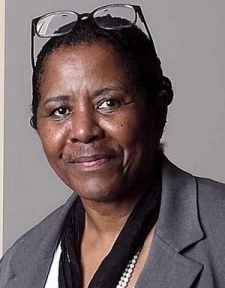Leading Care: Dr. Gloria McNeal and the National University, San Diego
In this interview, Gloria J. McNeal ’70 BSN, PhD, MSN, ACNS-BC, FAAN discusses her leadership in advancing nurses and health care through higher education.
She is Founding Dean and Professor, Mervyn M. Dymally School of Nursing, Charles R. Drew University of Medicine and Science, Los Angeles CA for 3.5 years.
Dean, School of Health and Human Services, National University, San Diego for 6 years.
Currently, Associate Vice President for Community Affairs in Health, National University San Diego for the past 6 months.

How did you rise to this leadership position?
While still a student at Villanova University, I was appointed to the rank of Ensign in the US Navy Nurse Corps, where I was taught leadership skills and promoted to higher ranks. When I returned to the civilian sector, I carried those leadership skills with me in pursuing academic appointments. Upon completing the MSN program at the University of Pennsylvania, I returned to Penn to earn a PhD in Higher Education Administration, which was awarded with meritorious distinction and which provided me with the skills needed to excel in academe. Further leadership skills were developed as a RWJF Fellow, American Academy of Nursing Fellow, and Fellow of the AACN Academic Leadership Nursing Program.
Who influenced you?
While I have had the wonderful fortune of being mentored by many nurse leaders, the most influential person who guided me in my early academic career trajectory was Dr. Claire Fagin. She shaped my thinking about what constitutes a leader, encouraged me to assume positions of leadership within nursing professional organizations, and stressed the importance of engaging in research and publishing my work. While a student at Villanova University, Dean (Dorothy) Marlow supported my efforts to become the SNAP representative for the College, and introduced me to the leadership of Chi Eta Phi, actually accompanying me to the meetings held in Philadelphia.
Why is it important to you? Why are you enthusiastic about your work in this role?
I believe that it is vitally important that nurses have a seat at the table. In my new position as AVP, I play a larger role in decision making at the top of the university. I am now charged with the responsibility to provide the vision and dynamic leadership for the University’s comprehensive community and global outreach strategies related to healthcare services and education, working closely with senior academic and administrative leaders.
What are the issues you deal with and what’s the biggest challenge in your area?
Having been continuously federally funded with extramural grant awards for the past 19 years and approved for over $20 million during that time span, my greatest challenge has been in sustaining revenue beyond the grant funding period. My grant funding has been primarily awarded for the design and implementation of nurse-led clinics at four different academic institutions and from coast-to-coast. While I have endeavored to secure third-party reimbursement for these innovation projects, there remains significant barriers for advanced practice nurses to function at the top of their scope of practice and to receive equitable payor reimbursement as autonomous practitioners.
How are you effective in your role? What’s critical to your success in the role?
I think the effectiveness of my role is measured by the extent to which I can build academic programs; support faculty and students in their academic pursuits; achieve national accreditation; ensure high state board, retention and graduation rates; secure extramural funding; and, bring about national and global recognition for the institutions at which I have held academic appointments. Critical to my success has been my recognition as an author, having published over 160 books/book chapters, editorials, journal articles, and abstracts.
How does innovation fit into your role as leader?
I believe that, in the not too distant future, most of health care will be delivered in cyberspace. Toward that end, it is imperative that we incorporate technological advances into the nursing curriculum of study, well beyond merely the electronic health record. I have spent the last 2 decades of my career building virtual nurse-led clinics, which enable the remote monitoring of patient biometric data across geographic boundaries, for which my work has been recognized by AARP, American Academy of Nursing, the Association of Critical Care Nurses, Robert Wood Johnson Foundation and others.
Is there anything you wish you’d done differently on your rise to this position or while in it?
Yes, I wish that early on I had allotted time to serve on NIH review committees. In addition to my statewide committee positions, I wish I had had the time to serve on more national and international health care committees.
What’s your advice to someone who wants to be a leader in their area of interest?
Develop an area of passion within the healthcare arena, pursue that passion, publish your findings, present at national and international forums, serve on professional nursing and healthcare committees, and engage in political activities with elected officials to help promote and advance your concepts.
What is your leadership philosophy?
My leadership style promotes a democratic and open cultural climate, permitting time for all voices to be heard. I believe in the need to achieve consensus before moving forward with any idea or concept.
What’s your hope for our profession?
My hope is that we seize the moment and capitalize on the WHO designation of 2020 as the Year of the Nurse and Midwife. Both within the nation and worldwide, nursing needs to be viewed as a major contributor to the healthcare arena, with all of the authority and responsibility afforded to other disciplines, in leading interprofessional teams of collaboration.
